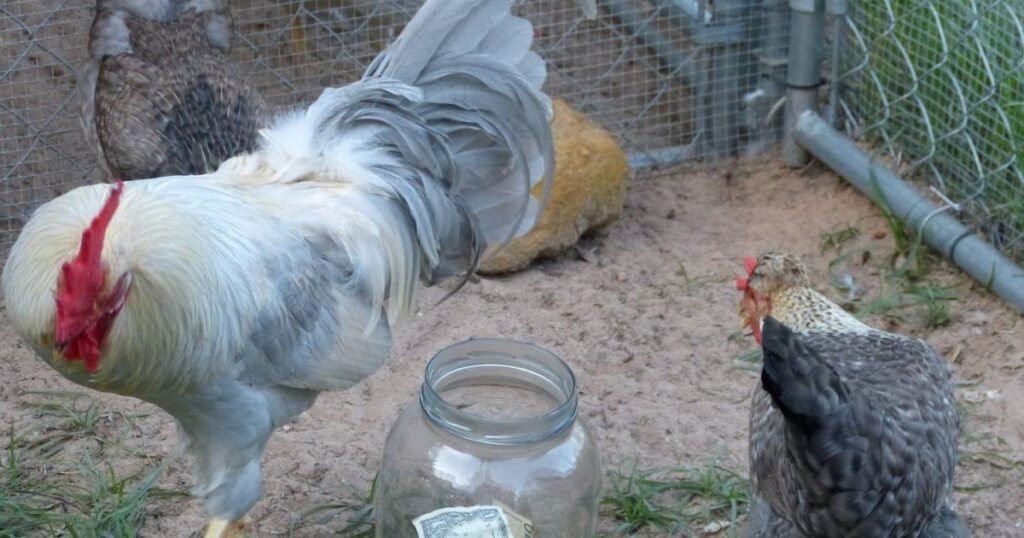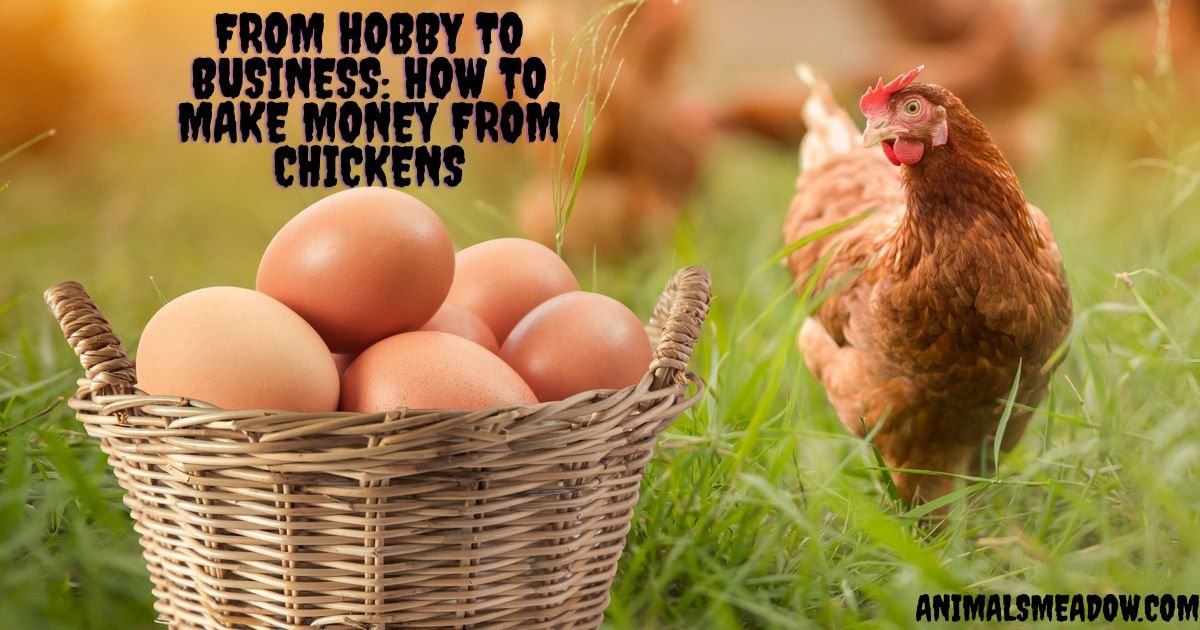From Hobby to Business: How to Make Money From Chickens
This idyllic scene isn’t just a dream; it can become your reality if you’re passionate about poultry! In today’s world, where sustainable living and local sourcing are gaining momentum, making money from chickens has transformed from a simple hobby into a thriving business opportunity.
So grab your notepad and prepare to take flight with ideas that could help you make money from chickens while enjoying every moment spent in their delightful company!
How to Sell Chicken Eggs
Selling chicken eggs can be a rewarding venture, both financially and personally. To start, ensure that your eggs are of the highest quality this means keeping your chickens healthy, feeding them a balanced diet, and maintaining clean living conditions.
Regularly check for any cracked or damaged eggs, as these can pose health risks to consumers. Consider implementing a system for collecting and washing the eggs to keep them fresh and appealing.
Before you begin selling, it’s crucial to research local regulations regarding egg sales in your area. Many states or countries have specific requirements that may include obtaining a license or adhering to health codes.
Once you’re compliant with these regulations, you can explore various sales channels such as farmers’ markets, local grocery stores, or even setting up an online store.
Building relationships with customers through social media or community events can also help promote your product and establish a loyal customer base.
How Much Money Can You Make Selling Farm Fresh Eggs?
The potential earnings from selling farm fresh eggs can vary significantly based on several factors, including the number of chickens you raise, their egg-laying capacity, and local market conditions.
For instance, if you have a flock of Leghorn chickens, which are known to lay around 300 eggs per year each, and your family consumes none of those eggs, you could potentially sell about 25 dozen eggs annually. This could yield approximately $100 in gross profit if sold at a reasonable price.
With a flock of 20 chickens, you can expect to produce around 300 eggs per month, which translates to approximately 500 dozen eggs annually. If you sell those eggs at an average price of $4 per dozen, you could earn about $2,000 a year. If you manage to sell them for $5 per dozen, your annual revenue could increase to around $2,500.
Selling Fertilized Chicken Eggs for Hatching
Selling fertilized chicken eggs for hatching offers a unique opportunity to connect with passionate poultry enthusiasts eager to embark on their own chick-rearing journey. By offering reliable and healthy fertilized eggs, you can tap into the growing trend of backyard farming and sustainable living.
When marketing your product, transparency about the breed’s characteristics such as temperament, egg production rates, and hardiness enables potential buyers to make informed decisions that align with their goals.
To further enhance customer satisfaction, consider providing detailed care guides tailored specifically to each breed you sell. This not only fosters trust but also equips your customers with the necessary knowledge for successful incubation and chick development.
Prioritizing secure packaging is vital; utilizing cushioning materials like foam inserts or bubble wrap ensures that delicate eggs arrive unharmed, fostering repeat business through proven reliability in quality. By merging education with great service, you’re not just selling a product; you’re inspiring others to create flourishing flocks of their very own!
How Much Can You Make from Selling Fertilized Chicken Eggs?

The income potential from selling fertilized chicken eggs can vary greatly depending on several factors, including the breed of chicken, local demand, and the quality of the eggs. A general rule of thumb is that fertilized eggs typically sell for between $1 and $3 each.
For example, rare or heritage breeds may command higher prices due to their popularity among hobbyists and breeders looking for specific traits.
Starting with a flock of just one Leghorn chicken that produces around 300 eggs annually, a family that consumes none can potentially generate $600 by selling 25 dozen eggs at $2 each.
Scaling up to a flock of 20 chickens increases your gross earnings significantly tallying up to an impressive $12,000 if sold at the same rate. This dramatic increase showcases how even modest investments in livestock can compound returns as you expand your operation.
Positioning yourself within niche markets can further enhance your profitability. If you sell high quality or specific breed fertilized eggs such as heritage breeds or organic varieties you could easily command higher prices.
For example, raising those same 20 chickens and selling their fertilized eggs at $3 each would elevate your yearly income to $18,000! By adapting marketing strategies and selecting premium breeds that appeal to health conscious consumers or hobbyist farmers, not only do you optimize profits but also create sustainable practices that resonate with today’s eco aware clientele.
In this thriving sector of agriculture, the potential for profit is as fertile as the land itself!
How To Sell Baby Chicks
Selling baby chicks can be a rewarding venture, especially when approached with an understanding of market demand and proper care. To maximize your profitability, consider specializing in rare or heritage breeds that attract dedicated enthusiasts willing to pay a premium.
Creating an engaging online presence through social media or a dedicated website can promote your offerings and connect with potential buyers who share your passion for poultry.
Time management is crucial; day old chicks are most appealing when they’re healthy and lively, so have all logistics in place for prompt sales after hatching. Invest in proper incubators and heating elements to maintain ideal conditions, ensuring you produce robust chicks ready for new homes.
Offering bundles of various breeds or introducing value-added services like chick raising guides can also enhance appeal, helping customers feel confident as they embark on their poultry journey.
Fostering relationships with local farming communities could open opportunities for repeat business and referrals, boosting your reputation as a reliable source of quality baby chicks.
How To Sell Chicken Meat
When it comes to selling chickens, focusing on the appeal of laying hens can significantly enhance your profitability. Advertise the benefits: consumers are often looking for birds that not only provide fresh eggs but also adapt well to their existing flocks.
Highlighting traits such as sociability and egg production rates can set your hens apart from others on the market. Consider including tips for new chicken owners in your sales pitch like care instructions and feeding recommendations which can make the transition smoother and help ensure their success.
On the flip side, while roosters may seem less desirable based purely on utility, they still hold value for homesteaders with specific needs. For instance, showcasing a rooster’s role in flock protection or breeding potential can shift perceptions and widen your audience.
Engaging with local farming communities through social media or farmer’s markets allows you to share stories of particular roosters you’ve raised, perhaps highlighting a standout bird that has shown exceptional qualities or personality traits.
This personal touch cultivates connections that transcend simple transactions, transforming buyers into loyal customers eager to return when it’s time to expand their flocks.
How To Sell Chicken Meat
Selling chicken meat can indeed be a rewarding venture, especially as more consumers seek alternatives to mass-produced poultry. By raising your chickens in a clean and humane environment, you not only ensure high quality meat but also build trust with your customers who increasingly appreciate transparency in their food sources.
This local connection fosters loyalty and allows for pricing that reflects the value of your organic practices.
Consider diversifying the cuts of meat you offer beyond whole birds; selling specialty items like marinated options or unique seasoning blends can attract more customers and increase profits. Emphasizing ethical farming methods could also differentiate your product sharing your story about how your chickens are cared for enriches the consumer experience.
Navigating local regulations might seem daunting at first, but understanding these requirements will not only keep you compliant but help position your brand as one that prioritizes quality and safety in every bite.
How To Sell Chicken Manure

Selling chicken manure can indeed be a profitable venture for poultry owners, given its high nutrient content and demand among gardeners and farmers. To start, you need to collect and properly store the manure to maintain its quality.
Ensure that it is composted adequately to reduce pathogens and odors, which will make it more appealing to potential buyers. Composting also helps balance the nitrogen levels, making it safer for plants when applied as fertilizer.
Once your chicken manure is ready for sale, consider promoting it through local farmer’s markets, gardening clubs, or online platforms like social media and community forums. Highlight its benefits such as being an organic fertilizer that enhances soil health and promotes plant growth to attract environmentally conscious consumers.
Establishing relationships with local nurseries or agricultural supply stores can also provide a steady market for your product. With proper marketing and quality control, selling chicken manure can turn into a rewarding side business while benefiting the environment by providing sustainable fertilization options.
How To Sell Chicken Feathers
Selling chicken feathers can be a rewarding venture, especially if you tap into the growing market for craft supplies. Start by gathering feathers from your chickens during molting seasons, as this is when they naturally shed their plumage.
Ensure that the feathers are clean and sorted by size and color to attract a broader range of buyers. You can package them in small bags or jars, which makes them more appealing to crafters looking for specific materials.
To reach potential customers, consider setting up an online shop on platforms like Etsy or eBay, where handmade and unique items are highly sought after. Social media can also be an effective tool for promoting your feathers; join crafting groups on Facebook or Instagram and share creative ways people can use chicken feathers in their projects.
Attending local craft fairs or farmers’ markets can help you connect directly with artisans who may be interested in purchasing your product. By leveraging these channels, you can successfully turn chicken feathers into a profitable side business!
How To Offer Chicken Boarding Services / Chicken Sitting
Offering chicken boarding services can be a rewarding venture, especially for those who are passionate about poultry care. To get started, you’ll need to establish a safe and comfortable environment for the chickens. This could mean setting up a dedicated area in your backyard or utilizing an existing coop that meets their needs.
Ensure that the space is secure from predators, has proper ventilation, and includes essentials like food, water, and bedding. Familiarize yourself with basic chicken care practices to ensure you can provide excellent service.
Once your setup is ready, promote your services within your community through social media, local bulletin boards, or word of mouth. Highlight the benefits of your chicken boarding such as personalized care and a stress free environment for pet owners looking for reliable options while they travel or are away from home.
Consider offering additional services like regular updates or photos of their chickens to provide extra peace of mind. By combining good animal husbandry with effective marketing, you can create a successful chicken boarding business that benefits both you and fellow chicken enthusiasts in your area.
How To Sell Chicken-Related Products and Merchandise
Selling chicken-related products and merchandise is a fantastic way to transform your passion for poultry into a profitable venture. With the rise of the backyard chicken movement, there’s a blossoming market of enthusiasts eager to express their love for their feathery friends through unique apparel and decor.
Think beyond standard prints: explore quirky quotes about chickens or artistic illustrations that capture their charm. By collaborating with local artists or designers, you can create exclusive pieces that stand out while also bolstering community involvement.
Creating thoughtful chicken-themed crafts opens up endless possibilities. Handmade chicken coops or creatively designed feeders not only serve practical purposes but also add character to any backyard setting. Customers appreciate craftsmanship just as much as functionality.
Don’t overlook the digital landscape; writing e-books on topics such as breeding chickens for profit can cater to both novice and experienced farmers alike, offering them valuable insights while generating passive income.
Embracing these diverse avenues keeps your business fresh and aligns it with the genuine interests of fellow chicken lovers, all while successfully cashing in on this booming niche market.
How To Share Your Experience With Others
Sharing your chicken farming journey can transform a personal passion into a lucrative venture. By documenting your experiences on platforms like a blog or YouTube channel, you not only showcase the daily realities of raising chickens but also invite others into your world.
This authentic storytelling fosters community while providing ample opportunities for monetization through affiliate links and advertisements tailored to fellow poultry enthusiasts.
Consider offering personalized consulting services or crafting online courses that delve deeper into specific aspects of chicken care from breed selection to disease management. Many people are eager to learn from those who have walked the path before them. You can also create informative articles that address common challenges and solutions in chicken farming, establishing yourself as a trusted resource within this niche market.
In sharing your knowledge and expertise, you don’t just make money from chickens; you also enrich the global story of sustainable farming practices and community engagement in agriculture.
How To Sell Chickens
Selling chickens can be a rewarding venture, whether you’re aiming to provide fresh eggs or meat to your local community. The first step is to determine your target market. Are you selling live chickens, eggs, or processed meat? Research local regulations and zoning laws regarding poultry sales in your area, as these can vary significantly.
Consider the breed of chickens you want to sell; heritage breeds may attract more interest for their unique qualities and flavor.
Once you’ve established your product and market, create an effective marketing strategy. Utilize social media platforms like Facebook and Instagram to showcase your chickens and connect with potential customers. Setting up a booth at farmers’ markets or local fairs can also help you reach a wider audience.
Don’t forget that word of mouth encourages satisfied customers to share their experiences with friends and family. Providing excellent customer service and maintaining high-quality standards will not only help you make initial sales but also build a loyal customer base over time.
Where To Sell Chickens

Selling chickens can be done through various channels, depending on your location and the type of chickens you have. One of the most popular options is local farmers’ markets, where you can connect directly with customers who appreciate fresh, locally raised poultry.
Setting up a booth allows you to showcase your chickens and engage with buyers, providing them with information about your farming practices and the benefits of purchasing from local producers.
Another effective avenue is online platforms such as Craigslist or Facebook Marketplace. These websites allow you to reach a broader audience, and you can post pictures and descriptions of your chickens to attract potential buyers.
Consider joining local farming or homesteading groups on social media; these communities often have members looking for livestock. If you’re raising specific breeds or organic chickens, reaching out to specialty stores or restaurants that focus on farm to table offerings can also be a lucrative option.
Where to Sell and Advertise Your Chicken Business?
Chicken owners can use websites and online platforms to advertise their business and earn more money. some plans that you can use.
- Farmers Market
- Website
- Craigslist
- Blog
- Etsy
- Facebook Marketplace
- Relatives, friends, neighbors and coworkers
- Farm Stand
- Poultry Swap
- Signs at Local Feed Stores, Pet Stores, or Veterinary Offices
- Restaurant
- Community Bulletin Boards
- Animal Auction
- Word of Mouth
Conclusion
Transforming your chicken-keeping hobby into a profitable business is both an exciting and rewarding venture. By carefully researching market demands, implementing effective management practices, and diversifying your offerings be it eggs, meat, or value-added products you can create a sustainable income stream.
Building a solid customer base through social media and local markets will help you grow your brand and increase sales. Remember that success requires dedication, patience, and continuous learning about the industry trends. So why wait? Start planning your chicken business today and reap the benefits of your passion!
FAQs
Which chicken breed is most profitable?
When it comes to profitability in broiler chicken farming, the Ross 308 and Cobb 500 breeds are often considered the top contenders. These hybrids are specifically bred for rapid growth and efficient feed conversion, which means they reach market weight more quickly than other breeds.
How many chickens do you need to make it worth it?
The number of chickens you need to make it worth your while can vary based on your goals and circumstances. If you’re looking for a small-scale backyard setup, four or five hens can provide a steady supply of fresh eggs for personal consumption.
Is local chicken farming profitable?
Local chicken farming can indeed be a profitable venture, especially when managed effectively. The demand for fresh, locally sourced poultry continues to rise as consumers become more health-conscious and seek alternatives to mass-produced chicken.
Can chickens save you money?
Yes, keeping chickens can indeed save you money, primarily through the fresh eggs they provide. If you regularly purchase eggs from the store, the cost can add up significantly over time.







